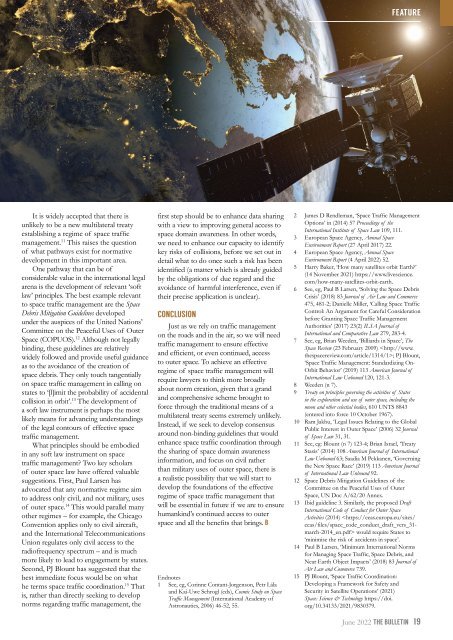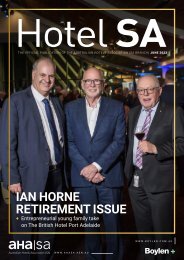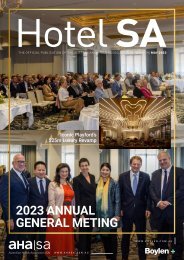LSB June 2022 LR
Create successful ePaper yourself
Turn your PDF publications into a flip-book with our unique Google optimized e-Paper software.
FEATURE<br />
It is widely accepted that there is<br />
unlikely to be a new multilateral treaty<br />
establishing a regime of space traffic<br />
management. 11 This raises the question<br />
of what pathways exist for normative<br />
development in this important area.<br />
One pathway that can be of<br />
considerable value in the international legal<br />
arena is the development of relevant ‘soft<br />
law’ principles. The best example relevant<br />
to space traffic management are the Space<br />
Debris Mitigation Guidelines developed<br />
under the auspices of the United Nations’<br />
Committee on the Peaceful Uses of Outer<br />
Space (COPUOS). 12 Although not legally<br />
binding, these guidelines are relatively<br />
widely followed and provide useful guidance<br />
as to the avoidance of the creation of<br />
space debris. They only touch tangentially<br />
on space traffic management in calling on<br />
states to ‘[l]imit the probability of accidental<br />
collision in orbit’. 13 The development of<br />
a soft law instrument is perhaps the most<br />
likely means for advancing understandings<br />
of the legal contours of effective space<br />
traffic management.<br />
What principles should be embodied<br />
in any soft law instrument on space<br />
traffic management? Two key scholars<br />
of outer space law have offered valuable<br />
suggestions. First, Paul Larsen has<br />
advocated that any normative regime aim<br />
to address only civil, and not military, uses<br />
of outer space. 14 This would parallel many<br />
other regimes – for example, the Chicago<br />
Convention applies only to civil aircraft,<br />
and the International Telecommunications<br />
Union regulates only civil access to the<br />
radiofrequency spectrum – and is much<br />
more likely to lead to engagement by states.<br />
Second, PJ Blount has suggested that the<br />
best immediate focus would be on what<br />
he terms space traffic coordination. 15 That<br />
is, rather than directly seeking to develop<br />
norms regarding traffic management, the<br />
first step should be to enhance data sharing<br />
with a view to improving general access to<br />
space domain awareness. In other words,<br />
we need to enhance our capacity to identify<br />
key risks of collisions, before we set out in<br />
detail what to do once such a risk has been<br />
identified (a matter which is already guided<br />
by the obligations of due regard and the<br />
avoidance of harmful interference, even if<br />
their precise application is unclear).<br />
CONCLUSION<br />
Just as we rely on traffic management<br />
on the roads and in the air, so we will need<br />
traffic management to ensure effective<br />
and efficient, or even continued, access<br />
to outer space. To achieve an effective<br />
regime of space traffic management will<br />
require lawyers to think more broadly<br />
about norm creation, given that a grand<br />
and comprehensive scheme brought to<br />
force through the traditional means of a<br />
multilateral treaty seems extremely unlikely.<br />
Instead, if we seek to develop consensus<br />
around non-binding guidelines that would<br />
enhance space traffic coordination through<br />
the sharing of space domain awareness<br />
information, and focus on civil rather<br />
than military uses of outer space, there is<br />
a realistic possibility that we will start to<br />
develop the foundations of the effective<br />
regime of space traffic management that<br />
will be essential in future if we are to ensure<br />
humankind’s continued access to outer<br />
space and all the benefits that brings. B<br />
Endnotes<br />
1 See, eg, Corinne Contant-Jorgenson, Petr Lála<br />
and Kai-Uwe Schrogl (eds), Cosmic Study on Space<br />
Traffic Management (International Academy of<br />
Astronautics, 2006) 46-52, 55.<br />
2 James D Rendleman, ‘Space Traffic Management<br />
Options’ in (2014) 57 Proceedings of the<br />
International Institute of Space Law 109, 111.<br />
3 European Space Agency, Annual Space<br />
Environment Report (27 April 2017) 22.<br />
4 European Space Agency, Annual Space<br />
Environment Report (4 April <strong>2022</strong>) 52.<br />
5 Harry Baker, ‘How many satellites orbit Earth?’<br />
(14 November 2021) https://www.livescience.<br />
com/how-many-satellites-orbit-earth.<br />
6 See, eg, Paul B Larsen, ‘Solving the Space Debris<br />
Crisis’ (2018) 83 Journal of Air Law and Commerce<br />
475, 481-2; Danielle Miller, ‘Calling Space Traffic<br />
Control: An Argument for Careful Consideration<br />
before Granting Space Traffic Management<br />
Authorities’ (2017) 23(2) ILSA Journal of<br />
International and Comparative Law 279, 283-4.<br />
7 See, eg, Brian Weeden, ‘Billiards in Space’, The<br />
Space Review (23 February 2009) ; PJ Blount,<br />
‘Space Traffic Management: Standardizing On-<br />
Orbit Behavior’ (2019) 113 American Journal of<br />
International Law Unbound 120, 121-3.<br />
8 Weeden (n 7).<br />
9 Treaty on principles governing the activities of States<br />
in the exploration and use of outer space, including the<br />
moon and other celestial bodies, 610 UNTS 8843<br />
(entered into force 10 October 1967).<br />
10 Ram Jakhu, ‘Legal Issues Relating to the Global<br />
Public Interest in Outer Space’ (2006) 32 Journal<br />
of Space Law 31, 31.<br />
11 See, eg: Blount (n 7) 123-4; Brian Israel, ‘Treaty<br />
Stasis’ (2014) 108 American Journal of International<br />
Law Unbound 63; Saadia M Pekkanen, ‘Governing<br />
the New Space Race’ (2019) 113 American Journal<br />
of International Law Unbound 92.<br />
12 Space Debris Mitigation Guidelines of the<br />
Committee on the Peaceful Uses of Outer<br />
Space, UN Doc A/62/20 Annex.<br />
13 Ibid guideline 3. Similarly, the proposed Draft<br />
International Code of Conduct for Outer Space<br />
Activities (2014) would require States to<br />
‘minimise the risk of accidents in space’.<br />
14 Paul B Larsen, ‘Minimum International Norms<br />
for Managing Space Traffic, Space Debris, and<br />
Near Earth Object Impacts’ (2018) 83 Journal of<br />
Air Law and Commerce 739.<br />
15 PJ Blount, ‘Space Traffic Coordination:<br />
Developing a Framework for Safety and<br />
Security in Satellite Operations’ (2021)<br />
Space: Science & Technology https://doi.<br />
org/10.34133/2021/9830379.<br />
<strong>June</strong> <strong>2022</strong> THE BULLETIN 19


















